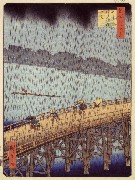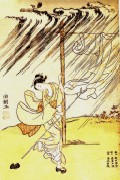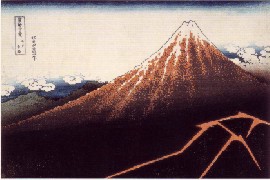Return Home
Top Previous Next
2. Words as expression of nature itself
We will discuss visible effects on Japanese words by our natural environ-
ment and the relationship between Japanese esthetic sensitivity and nature.
Words
Needless to say, each country has its own way of life, culture, and
language that are influenced by and based on Mother Nature.
Let's take a look at the Inuit, who live in the Arctic Circle and are
said to have their own numerous words to describe how snow and
ice are like below:
1. aput = snow on ground
2. qaniit = snow in air/falling
3. qanik = snowflake
4. aakkarniq = rotten ice with streams forming
5. utsinniq/puvvinniq = wet snow on top of ice.
As for Japan, from spring to summer we have various words
relating to turning points of each season like below:
1. Risshun = the first day of spring
2. Shunbun = the vernal equinox
3. Tsuyu = rainy season
4. Rikka = the first day of summer
Words and rain
Japanese people have lived their lives fluctuating between joy and
sorrow which was caused by an ever changing environment like rain, snow,
and thunder. For example, the Japanese word of "ame" has various family
words such as
"Harusame" (spring rain),
"Samidare"(early summer rain),
"Yudachi"(sudden shower).
These words are shown in "Ukiyoe" which are woodcut prints from the Edo
period and are shown below.
The rain described in "Ukiyoe" are of a sudden thunder shower.


 *These three prints are from three Ukiyoe painters, from left to right,
Hiroshige, Harunobu, and Hokusai.
Also "Ame" has another family of expressions of how rain falls, like
"Kiri-same"(drizzle),
"Go-u"(heavy rain),
"Rai-u"(thunderstorm).
We have a lot of religious statues, decorations and other things relating
to weather and climate in many shrines throughout Japan.
Aestheic sensitivity
The vivid but delicate changes in the four distinct
seasons are the starting points of cultivating our
delicate and aesthetic sensitivity. And the seasonal changes
have great influenced on the thought of the so called
"pathos of things".
Moreover, the beautiful and well-kept garden called "Nihon-teien" is
designed in accordance with the appearance of nature. It is an
expression of landscape and is composed of rocks, trees, ponds,
and other natural objects that are closely related to our
distinct environment.
As seen above, many words are based on nature. And these words
are sensitive and have cultivated the Japanese spiritual mind which
is closely related to the living land, Mother Nature.
Let's move to the next section.
Top Previous Next
*These three prints are from three Ukiyoe painters, from left to right,
Hiroshige, Harunobu, and Hokusai.
Also "Ame" has another family of expressions of how rain falls, like
"Kiri-same"(drizzle),
"Go-u"(heavy rain),
"Rai-u"(thunderstorm).
We have a lot of religious statues, decorations and other things relating
to weather and climate in many shrines throughout Japan.
Aestheic sensitivity
The vivid but delicate changes in the four distinct
seasons are the starting points of cultivating our
delicate and aesthetic sensitivity. And the seasonal changes
have great influenced on the thought of the so called
"pathos of things".
Moreover, the beautiful and well-kept garden called "Nihon-teien" is
designed in accordance with the appearance of nature. It is an
expression of landscape and is composed of rocks, trees, ponds,
and other natural objects that are closely related to our
distinct environment.
As seen above, many words are based on nature. And these words
are sensitive and have cultivated the Japanese spiritual mind which
is closely related to the living land, Mother Nature.
Let's move to the next section.
Top Previous Next
Contact us


 *These three prints are from three Ukiyoe painters, from left to right,
Hiroshige, Harunobu, and Hokusai.
Also "Ame" has another family of expressions of how rain falls, like
"Kiri-same"(drizzle),
"Go-u"(heavy rain),
"Rai-u"(thunderstorm).
We have a lot of religious statues, decorations and other things relating
to weather and climate in many shrines throughout Japan.
Aestheic sensitivity
The vivid but delicate changes in the four distinct
seasons are the starting points of cultivating our
delicate and aesthetic sensitivity. And the seasonal changes
have great influenced on the thought of the so called
"pathos of things".
Moreover, the beautiful and well-kept garden called "Nihon-teien" is
designed in accordance with the appearance of nature. It is an
expression of landscape and is composed of rocks, trees, ponds,
and other natural objects that are closely related to our
distinct environment.
As seen above, many words are based on nature. And these words
are sensitive and have cultivated the Japanese spiritual mind which
is closely related to the living land, Mother Nature.
Let's move to the next section.
Top Previous Next
*These three prints are from three Ukiyoe painters, from left to right,
Hiroshige, Harunobu, and Hokusai.
Also "Ame" has another family of expressions of how rain falls, like
"Kiri-same"(drizzle),
"Go-u"(heavy rain),
"Rai-u"(thunderstorm).
We have a lot of religious statues, decorations and other things relating
to weather and climate in many shrines throughout Japan.
Aestheic sensitivity
The vivid but delicate changes in the four distinct
seasons are the starting points of cultivating our
delicate and aesthetic sensitivity. And the seasonal changes
have great influenced on the thought of the so called
"pathos of things".
Moreover, the beautiful and well-kept garden called "Nihon-teien" is
designed in accordance with the appearance of nature. It is an
expression of landscape and is composed of rocks, trees, ponds,
and other natural objects that are closely related to our
distinct environment.
As seen above, many words are based on nature. And these words
are sensitive and have cultivated the Japanese spiritual mind which
is closely related to the living land, Mother Nature.
Let's move to the next section.
Top Previous Next